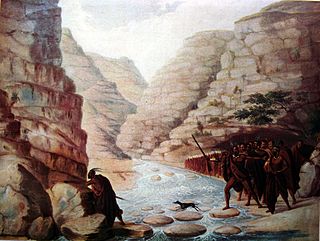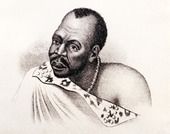
The Thembu are Xhosa people who lived in the Thembu Kingdom.

The Xhosa Wars were a series of nine wars between the Xhosa Kingdom and the British Empire as well as Trekboers in what is now the Eastern Cape in South Africa. These events were the longest-running military resistance against European colonialism in Africa.

Hintsa ka Khawuta, also known as Great or King Hintsa, was the king of the Xhosa Kingdom, founded by his ancestor, King Tshawe. He ruled from 1820 until his death in 1835. The kingdom at its peak, during his reign stretched from the Mbhashe River, south of Mthatha, to the Gamtoos River, in the Southern Cape.

King Sarhili was the King of Xhosa nation from 1835 until his death in 1892 at Sholora, Bomvanaland. He was also known as "Kreli", and led the Xhosa armies in a series of frontier wars.
Rharhabe ka Phalo was a Xhosa Prince and the founder of the Right Hand House of the Xhosa nation. Rarabe was the eldest son and right hand son of King Phalo ka Tshiwo.

The Bhaca people, or amaBhaca, are an Nguni ethnic group in South Africa.
Molteno is a town in Lombardy, Italy.
The Rharhabe House is the second senior house of the Xhosa Kingdom. Its royal palace is in the former Ciskei and its counterpart in the former Transkei is the Gcaleka, which is the great house of Phalo.
King (iKumkani) Maxhob'ayakhawuleza Sandile "Aa! Zanesizwe!" was the son of the late King Mxolisi Sandile "Aa! Bazindlovu", who was the son of King Archie Velile Sandile, and Queen Nolizwe, the daughter of Western Mpondoland King Victor Poto Ndamase "Aa! Bhekuzulu", and sister to both King Tutor Vulindlela Ndamase "Aa! Nyangelizwe" and the wife of Chief Thandathu Jongilizwe Mabandla of the AmaBhele aseTyhume royal clan. He was the 6th descendant of Sandile and 10th descendant of King Phalo, the Son of King Tshiwo.

The Gcaleka House is the Great house of the Xhosa Kingdom in what is now the Eastern Cape. Its royal palace is in the former Transkei and its counterpart in the former Ciskei is the Rharhabe, which is the right hand house of Phalo.

The Ngqika people are a Xhosa monarchy who lived west of the Great Kei River in what is today the Eastern Cape of South Africa. They were first ruled by Rarabe kaPhalo who died with his son Mlawu, who was destined for chieftaincy. The clan would be named after Ngqika ka Mlawu, the son of the then late Mlawu. It would be years before the child would rule his people who fought in the Xhosa Wars, which were sparked by the encroachment of European settlers on Xhosa lands.

Thembuland, Afrikaans: Temboeland, is a natural region in the Eastern Cape province of South Africa. Its territory is the traditional region of the abaThembu.

King Madzikane was the founder and a King of the amaBhaca nation. He was the son of the Zelemu King Khalimeshe kaWabana.
The Imidushane clan was founded by one of the greatest Xhosa warriors Prince Mdushane who was the eldest son of Prince Ndlambe, the son of King Rharhabe.
Chief Falo kaMgudlwa was a Chief of AmaJumba Clan, of the abaThembu people near Qhumanco, Ngcobo. His household was based at Lucwecwe.
Emma Sandile, also known as Princess Emma, was the daughter of the Rharhabe Xhosa King Sandile kaNgqika. She was educated by the British in the Cape Colony, and later became a landowner possibly the first black woman to hold a land title in South Africa.
Nofinishi Dywili (1928–2002) was a traditional Xhosa musician who achieved much recognition throughout her lifetime. She is regarded as the master of "uhadi" music and the master of Xhosa song productions such as The Bow Project.








